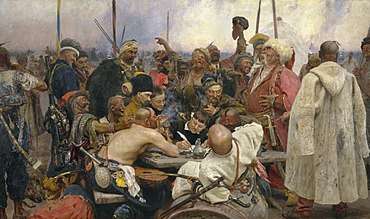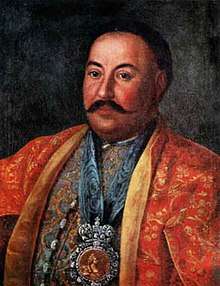Ataman
Ataman (variants: otaman,[1] wataman, vataman; Russian: атаман, Ukrainian: отаман) was a title of Cossack and haidamak leaders of various kinds. In the Russian Empire, the term was the official title of the supreme military commanders of the Cossack armies. The Ukrainian version of the same word is Hetman. Otaman in Ukrainian Cossack forces was a position of a lower rank.
| Part of a series on |
| Cossacks |
|---|
 |
| Cossack hosts |
| Other groups |
| History |
| Cossacks |
| Cossack terms |
Etymology
The etymologies of the words ataman and hetman are disputed. There may be several independent Germanic and Turkic origins for seemingly cognate forms of the words, all referring to the same concept. The hetman form cognates with German Hauptmann ('captain', literally 'head-man') by the way of Czech or Polish, like several other titles. The Russian term ataman is probably connected to Old Russian vatamanŭ, and cognates with Turkic odoman (Ottoman Turks). The term ataman may had also a lingual interaction with Polish hetman and German hauptmann.[2]
The word is more probably of Turkic origin, literally meaning 'father of horsemen'.[3][4] During certain periods, broadly corresponding with involvement with the Polish–Lithuanian Commonwealth, the supreme leader of Ukrainian Cossacks was called the hetman. The ataman form is more commonly found in Russian periods, and exists in modern Russian, Turkish, and Tatar.

Otaman in Ukraine and Russia
Otamans were usually elected by the Host Council or could have been appointed, especially during the military campaigns. The appointed otamans were called acting otaman (наказний отаман, nakazny otaman).
In the Cossack Hetmanate, leaders of non-Cossack military units (artillery, etc.) were also called otamans. In the Cossack Hetmanate, the title was used for the administrative purposes, such as the head of the city, City Otaman (городовий отаман). Later such administrative uses were adopted by the Kuban Cossacks and were common in Kuban Oblast with different variations.
There were various types of otaman:
- Army otaman (військовий отаман), an executive officer in the Zaporizhian Host
- Campaign otaman (похідний отаман)
- Kosh otaman (кошовий отаман)
- Kurin otaman (курінний отаман), a commander of a kurin;
- Sotenny otoman (сотенний отаман) and city otaman (городовий Отаман) were the sotnyk's lieutenants. Those titles were introduced during the Hetmanate in the 17th century. Together with the osaul (осавул, 'aide-de-camp') and chorąży (хорунжий, 'flag-bearer'), this otoman helped the sotnyk in administrative affairs.
- Village otoman (сільський отаман), an administrative rank in the 17th to 18th centuries
- Okrug otaman (окружний отаман), a territorial leader
- Stanytsia otaman (станичний отаман), a territorial leader
- Khutir otaman (хутірський отаман), a territorial leader
Otamans were also in charge of general- and regimental-size artillery units, as well as any volunteer military formations and the Zholdak cavalry.
20th century
Atamans were the titles of supreme leaders of various Cossack armies during the Russian Civil War.
When Ukraine acquired its independence in 1918, the rank took on different value. Among the Ukrainian Sich Riflemen and the Ukrainian Galician Army, it was equivalent to a major, as is the battalion executive officer today. In the Ukrainian People's Republic, the title was of a general rank. Chief Otoman (головний отаман) was the general of the Ukrainian Army who was assisted by his deputies, Acting Otomans.
The head of the army of the Ukrainian People's Republic, in particular, Symon Petliura, was called Supreme Otaman (головний отаман).
References
- "Otoman" in The Encyclopedia of Ukraine (in English)
- "ataman". YourDictionary. Retrieved 2019-07-17.
- "The Cossacks: A super-ethnos in Russia's ribs". The Economist. December 21, 1996.
- "Ataman". Cossackweb.narod.ru. Retrieved July 6, 2012.
External links
- Encyclopedia of Ukraine main page (in English)